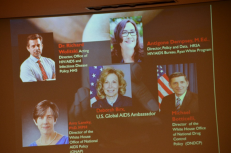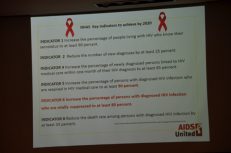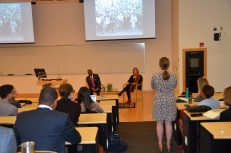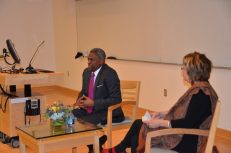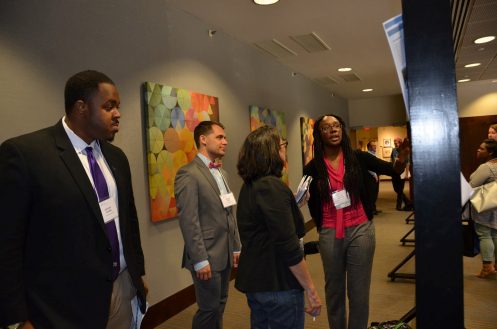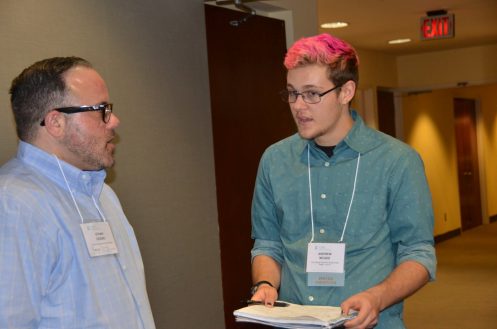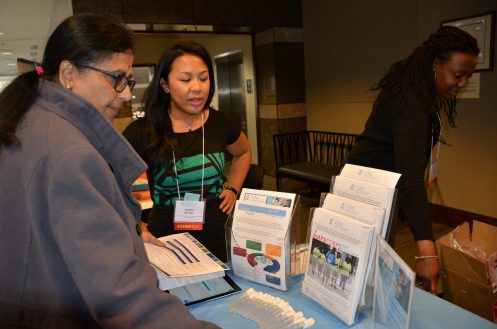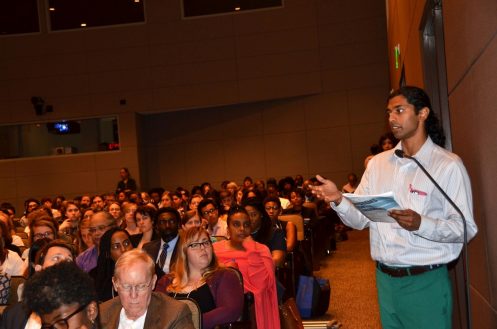Related Posts
Milan addresses challenges for the HIV/AIDS community
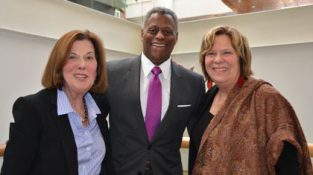
Dr. Peggy Bentley, associate dean for global health (right), and I (left) were thrilled to welcome Jesse Milan Jr. to the Gillings School on Feb. 17.
The Gillings School welcomed Jesse Milan Jr., president and chief executive officer of AIDS United and member of our School’s Advisory Council, for a visit and a talk on “The Trump Administration and the New Congress: Challenges for the HIV/AIDS Community.”
Milan spoke about the challenges of navigating the new normal and what that might mean for HIV/AIDS research and people at risk. He described his journey from undergraduate days at Princeton University, to law school at NYU, to public health work in Philadelphia and then at SRA Constella Group, with Don Holzworth, who is now the Gillings School’s executive in residence and chair of the advisory council.
Milan demonstrated, with wit, charm and brilliance, what it was like for a gay, black male to travel that distance, including what it has been like to live with HIV for more than 30 years. A recognized global leader, chair emeritus of the Black AIDS Institute board of directors, and member of the scientific advisory board for the President’s Emergency Plan for AIDS Relief (PEPFAR), Milan is a role model for students – and for me, as well. Students and others asked more questions than I’ve seen asked of any speaker – a sure indication of interest. Milan also spent time in smaller sessions with students and faculty members.
Q and A with Jesse Milan
(Clockwise from top left): Jesse Milan spoke of important partners in the work to prevent and treat HIV/AIDS, including Gillings School alumna Dr. Amy Lansky (bottom left of slide); He also outlined the goals for HIV/AIDS prevention and treatment to be accomplished by 2020; Milan and Dr. Peggy Bentley sat down for a chat with students, faculty members and others; A number of people had questions for Milan.
Leader of AIDS United, a national organization focused on grant making, policy and capacity building, Jesse Milan Jr. has lived with HIV for more than 30 years.
Recently, he served as an expert consultant on projects related to HIV for the Centers for Disease Control and Prevention (CDC), National Minority AIDS Council, the Health Resources and Services Administration (HRSA), and the U.S. Health and Human Services’ Office of HIV/AIDS and Infectious Disease Policy.
From 2002 to2007, he co-chaired the CDC/HRSA advisory committee on HIV and STD prevention, treatment and care, and in 2007, was designated a Fulbright senior specialist in global HIV/AIDS.
He has served as board chair of five nonprofit organizations, conducted three speaking tours of Africa for the U.S. State Department, and delivered keynote addresses across the U.S., including at The White House.
38th annual Minority Health Conference
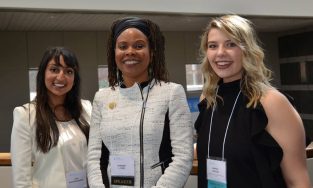
Conference planning co-chairs Jani Radhakrishnan (left) and Marisa Martini (right) posed with keynote speaker and Gillings School alumna, Dr. Chandra Ford.
Completely organized and led by Gillings School students, the 38th annual Minority Health Conference drew record numbers of participants (both onsite and virtual). More than 750 participated at the Friday Center, as did hundreds more in other locations, including overflow audiences elsewhere on campus and about 1,000 people who participated online.
The event featured highly relevant, inspiring speakers, breakout sessions, poster presentations and more. Each year, the conference seems unsurpassable in both quality and energy, and the Feb. 24 event at UNC’s Friday Center, with the theme, “Systems of Power: Recalling Our Past, Restructuring Our Future,” was no exception. I’m so proud of our students for organizing a conference with a focus on restructuring power. As I said in my welcome, never in my lifetime has it been more important to understand power. Attendees gained greater understanding of tools that can bring about civil social change and make them even more effective change makers. I was glad to attend Dr. Chandra Ford’s morning keynote. Ford, a Gillings School alumna, now is a very successful faculty member at UCLA. I understand that the afternoon keynotes by Drs. Robert Fullilove and Amy Locklear Hertel also were outstanding – and look forward to seeing the videos. Thanks to our current students and to those who first had the vision to start this conference, including Drs. Geni Eng, Bill Jenkins, Vic Schoenbach and William Small.
Barbara
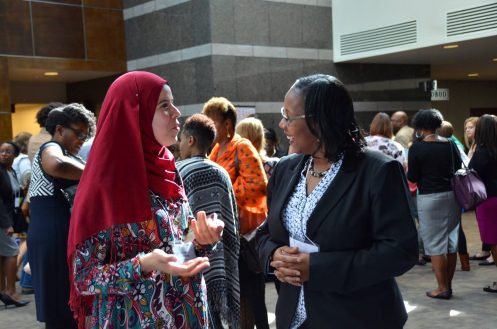
HPM student services manager Lynnette Jones (right) talks to a prospective student about the department.
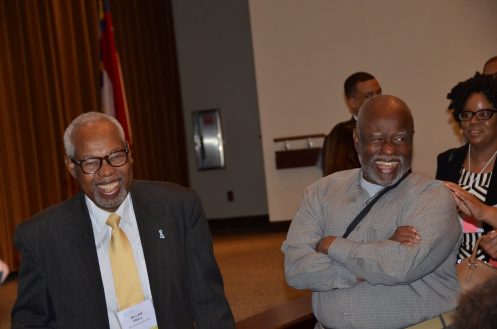
Bill Small (left) and Bill Jenkins are important and longtime supporters of the Minority Health Conference.

